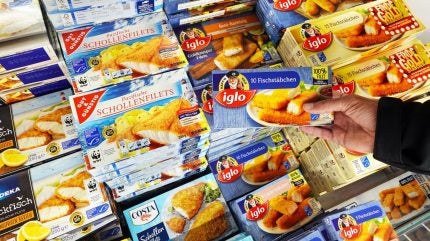
Nomad Foods has lowered its full-year 2025 revenue and adjusted EBITDA guidance, citing macroeconomic uncertainty and other challenges.
The UK-based frozen foods company expects organic revenue growth of 0%-2%, down from the previous forecast of 1%-3%.

Discover B2B Marketing That Performs
Combine business intelligence and editorial excellence to reach engaged professionals across 36 leading media platforms.
Adjusted EBITDA growth is also projected to slow to 0%-2%, compared with the earlier guidance of 2%-4%.
Adjusted EPS is now anticipated to be between €1.82 ($2.05) and €1.89, implying growth of 2%-6%, slightly below the lower end of the previous range of €1.85 to €1.89.
The owner of the Findus, Iglo and Ledo frozen food brands attributed the revision to several factors, including “greater than expected retailer inventory destocking, higher input-cost inflation, and macro uncertainty”.
Nomad Foods said its ongoing reinvestment in brands and products has also influenced the revised financial outlook, which was released alongside its first-quarter results.

US Tariffs are shifting - will you react or anticipate?
Don’t let policy changes catch you off guard. Stay proactive with real-time data and expert analysis.
By GlobalDataStéfan Descheemaeker, Nomad Foods CEO, added that top-line growth is expected to “accelerate throughout the remainder of the year”, although the company does not anticipate recovering the destocking-related losses incurred between January and March.
For the first quarter, Nomad Foods reported revenue €760m, a decrease of 3% compared to last year and a 3.6% decline in organic terms. Volumes dropped 3.7%.
Gross profit during the period increased by 0.3% to €212m, with a gross margin rise of 90 basis points to 27.8%.
Nomad Foods attributed the improvement in gross margin to supply chain productivity and the lapping of inventory revaluation headwinds from the previous year.
Adjusted EBITDA for the first quarter declined 1.8% to €120m, while adjusted EPS fell 5.4% to €0.35.
Nomad Foods co-chairman and founder Noam Gottesman said: “Quarterly results can be choppy but the frozen food category in Europe is healthy, Nomad Food’s leading brands are strong and its portfolio remains well positioned for evolving consumer trends.”
Commenting on tariffs, Descheemaeker said there is “no direct impact” at present.
However, he said that the macro environment is becoming “increasingly uncertain”, and the company expects further increases in some input costs.





